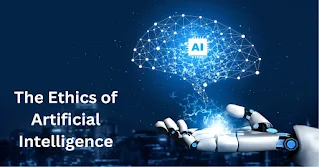AI is key to a better future, but needs code of ethics
👇👇👇
The future of AI needs a code of ethics it can digest large amounts of data and make rational decisions in situations where humans are swayed by emotions 😔. But it also has the potential to influence human behavior 👪. That's why an AI code of ethics is necessary to ensure that intelligent machines do not take away human autonomy.
Artificial Intelligence or AI is a system designed by humans to augment, replicate or replace human intelligence, and such systems are rapidly becoming integral to product development and organisational functioning. However, nine of every 10 organisations employing Al face ethical issues, according to Cap-Gemini Research Institute. Also, 65% of executives say they are aware of Al's discriminatory bias.
Need For Ethical Code Al systems are generated using large amounts of data. But if the data is faulty or biased, the AI will produce harmful and unfair results. That's why it has become imperative to frame the ethics of human-Al interaction, and organisations are devoting vast resources to develop such ethical codes.
Science fiction writer Isaac Asimov foresaw the dangers of Al years ago and had proposed his three Laws of Robotics' to ensure the safe use of robotic and AI systems. His first law says robots must not cause harm to humans through their actions or inaction. The second law requires robots to comply with human orders, except when such orders conflict with the first law. The third law directs robots to safeguard their own existence as long as it aligns with the principles of the first and second laws.
The central ethical concerns in human-AI interaction are, preserving human autonomy and ensuring transparency, because while Al can augment human decision making, it must not replace it entirely.
In November 2021, UNESCO provided the first-ever global AI standards. These 'Recommendations on the Ethics of Artificial Intelligence' aim to foster AI development and deployment prioritizing human rights, autonomy, and well-being. They emphasis inclusive, transparency, and account- ability to avoid discrimination, biases and harm.
UNESCO's framework seeks to ensure that AI technologies align with human values and contribute positively to societies worldwide. Transparency is an important requirement to allow users to understand AI recommendations, identify their biases, and prevent discrimination.
At the same time, privacy and data protection are crucial to prevent data misuse. According to a report by ZDNet's Daphne Le-prince Ringlet, 51 organisations, including Algorithm- Watch and the European Digital Society, submitted a letter to the European Union calling for an outright prohibition on surveillance activities.
Al & Behavioral Economics Behavioral economics is the study of human decision making in an economic context. It shows that humans are emotional beings and, therefore, prone to making sub optimal decisions. However, AI can contribute to increasing human well being with better decision-making. Data-driven choices can help organisations optimize their processes and achieve greater efficiency.
For example, AI takes care of the information overload that stresses humans, and makes 'informed' decisions, thereby making markets more 'rational'. AI has already revolutionized some decision-making processes by automating and accelerating complex tasks, leading to better and more accurate decisions. At the end of the day, organisations using AI benefit from improved customer understanding and more informed choices.
A study conducted by America's Defense Advanced Research Projects Agency (DARPA) shows AI-derived algorithmic expertise can cater to decision-making in situations where the benefit of human expertise or decision-making is not available, such as in combat or medical triage in the field.
No wonder, the intersection of behavioral economics and AI is a rapidly growing field. Interactions between humans and AI will necessitate collaboration and cooperation. But these 'intelligent' machines operate through complex algorithms, and the results they generate are not always predictable. Hence, human-AI interaction goes beyond mere mechanical or deductive coordination, and flexible strategies are needed for nuanced decision-making.
Importance Of Transparency AI systems possess the capability to analyse vast amounts of data and tailor their responses to influence human behavior subtly. For example, when you watch a YouTube video, the recommendations that follow are, uncannily to your taste.
Such psychological manipulation and persuasion capabilities in AI have raised ethical concerns, necessitating a balance between "personalized" experiences and user autonomy.
While the implementation of emotional intelligence enhances user experiences, it is important to be vigilant, about manipulation. For this, transparency is an essential condition. So is the awareness of Al limitations. Biases should be addressed to ensure equitable Al-driven decisions. Finally, effective feedback and reinforcement empower users while avoiding undue manipulation, fostering a responsible and harmonious human-Al relationship That's why incorporating ethical considerations and behavioral economic, insights into the development and deployment of AI technologies will pave the way for a promising future where AI serves humanity responsibly and ethically.
FAQs







![2023-2024 Iti Workshop calculation and science MCQ [Latest]](https://blogger.googleusercontent.com/img/b/R29vZ2xl/AVvXsEhGgp3rh9IMpumLZ4PkKjs8U74o_epkhHEcrazTJr6B06xyg56c8J1-qfXlIQhA2Ny2qxgYYtXU67ri4s_t2BmryCcsLUFoECe0Ns6GsqMVS-J6F5OJnw-DV9WZbT2NFKhBy4yBZqOrrkBsGXD0e_1_A0-gXqx1dDK138W5f8HBqEle1kXTBkLMx3N7-w/w72-h72-p-k-no-nu/new.png)

.jpg)

0 Comments
Thanks for visiting! We'd love to hear your thoughts – feel free to comment below.